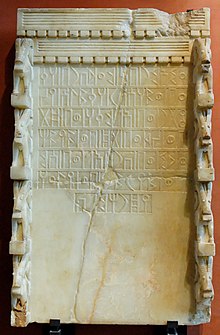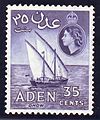Portal:Yemen
Yemen Portal


Yemen (/ˈjɛmən/ ⓘ; Arabic: ٱلْيَمَنْ, romanized: al-Yaman), officially the Republic of Yemen, is a sovereign state in West Asia. Located in the southern Arabian Peninsula, it borders Saudi Arabia to the north, Oman to the northeast, and the Indian Ocean to the south, sharing maritime borders with Eritrea, Djibouti and Somalia across the Horn of Africa. Covering roughly 528,000 square kilometres (203,861 square miles), with a coastline of approximately 2,000 kilometres (1,200 miles), Yemen is the second largest country on the Arabian Peninsula. Sanaa is its constitutional capital and largest city. Yemen's estimated population is 34.7 million, comprised mostly of Arab Muslims. It is a member of the Arab League, the United Nations, the Non-Aligned Movement and the Organisation of Islamic Cooperation.
Owing to its geographic location, Yemen has been at the crossroads of many civilisations for over 7,000 years. In 1200 BCE, the Sabaeans formed a thriving commercial kingdom that included parts of modern Ethiopia and Eritrea. In 275 CE, it was succeeded by the Himyarite Kingdom, which spanned much of Yemen's present-day territory and was heavily influenced by Judaism. Christianity arrived in the fourth century, followed by the rapid spread of Islam in the seventh century. Yemenite troops playing a crucial role in early Islamic conquests. Various dynasties emerged between the 9th and 16th centuries. During the 19th century, the country was divided between the Ottoman and British empires. After World War I, the Mutawakkilite Kingdom of Yemen was established, which in 1962 became the Yemen Arab Republic (North Yemen) following a coup. In 1967, the British Aden Protectorate became the independent People's Democratic Republic of Yemen (South Yemen), the first and only officially socialist state in the Arab world. In 1990, the two Yemeni states united to form the modern Republic of Yemen (al-Jumhūrīyah al-Yamanīyah), with Ali Abdullah Saleh serving as the first president until his resignation in 2012 in the wake of the Arab Spring.
Since 2011, Yemen has been enduring a political crisis, marked by street protests against poverty, unemployment, corruption, and President Saleh's plan to amend Yemen's constitution and eliminate the presidential term limit. By 2015, the country became engulfed by an ongoing civil war with multiple entities vying for governance, including the Presidential Leadership Council of the internationally recognized government, the Houthi movement's Supreme Political Council, and the separatist Southern Movement's Southern Transitional Council. This conflict, which has escalated to involve various foreign powers, has led to a severe humanitarian crisis. (Full article...)
Selected article -

The ancient history of Yemen or South Arabia is especially important because it is one of the oldest centers of civilization in the Near East. Its relatively fertile land and adequate rainfall in a moister climate helped sustain a stable population, a feature recognized by the ancient Greek geographer Ptolemy, who described Yemen as Eudaimon Arabia (better known in its Latin translation, Arabia Felix) meaning Fortunate Arabia or Happy Arabia. Between the eighth century BCE and the sixth century CE, it was dominated by six main states which rivaled each other, or were allied with each other and controlled the lucrative spice trade: Saba', Ma'īn, Qatabān, Hadhramaut, Kingdom of Awsan, and the Himyarite Kingdom. Islam arrived in 630 CE and Yemen became part of the Muslim realm.
The centers of the Old South Arabian kingdoms of present-day Yemen lay around the desert area called Ramlat al-Sab'atayn, known to medieval Arab geographers as Ṣayhad. The southern and western Highlands and the coastal region were less influential politically. The coastal cities were however already very important from the beginning for trade. Apart from the territory of modern Yemen, the kingdoms extended into Oman, as far as the north Arabian oasis of Lihyan (also called Dedan), to Eritrea, and even along coastal East Africa to what is now Tanzania. (Full article...)List of selected articles
|
|---|
Selected biography -

List of selected biographies
|
|---|
General images -
Selected city -
Selected picture -
Selected cuisines, dishes and foods -
List of articles
|
|---|
Related portals
Religions in Yemen
Arab states
Categories
Topics
Related portals
Religions in Yemen
Arab states
Associated Wikimedia
The following Wikimedia Foundation sister projects provide more on this subject:
-
Commons
Free media repository -
Wikibooks
Free textbooks and manuals -
Wikidata
Free knowledge base -
Wikinews
Free-content news -
Wikiquote
Collection of quotations -
Wikisource
Free-content library -
Wikiversity
Free learning tools -
Wiktionary
Dictionary and thesaurus









































































